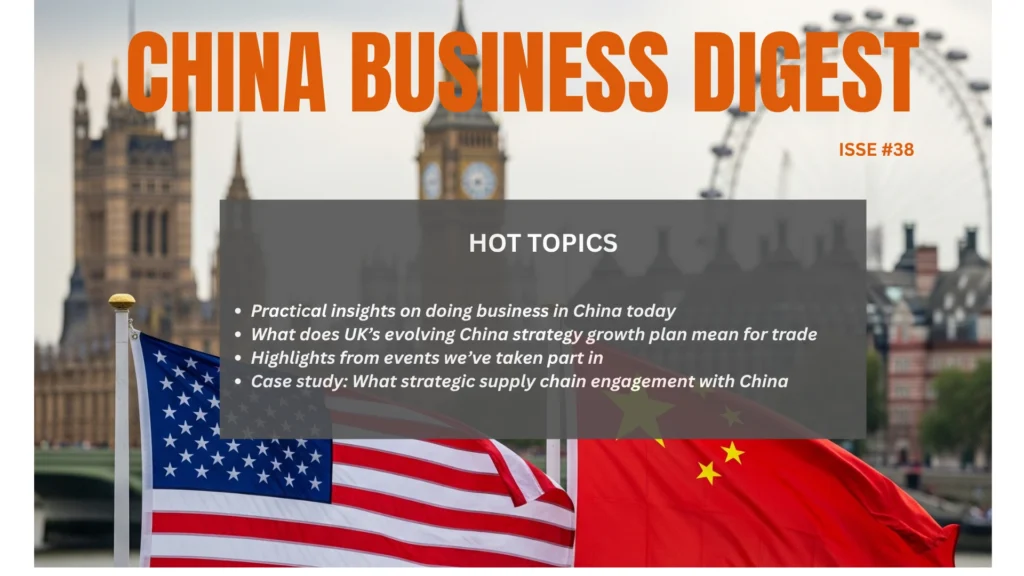Summary
- Hot topics: China Audit and the UK’s 10-year industrial strategy for growth – what do they mean for business?
- Insights: Is it easier to do business in China now? What about setting up a factory in there? Observations and a real case study
- Notice board: recap of some events we took part in
🔥 Hot Topics
🔍 Rethinking China through ‘Progressive Realism’ and ‘Recalibrating Strategy’, What Does It Mean?
The newly released China Audit report by the UK government lands in more pragmatic territory: cooperate where it counts, protect where it matters, with a tone notably cooler than before. The two main threads running through: national security and resilience, and strategic engagement with guardrails.
That means tightened scrutiny around critical infrastructure, a clear-eyed view of supply chain risks, and more investment in improving China fluency and expertise among civil servants on the one hand, and a nuanced ‘small garden, high fence’ approach to trade and business engagement with China on the other.
For businesses, the message from the dual-track approach to China – build strategic partnerships while reinforcing economic security – reads like: don’t exit, adapt. It’s about tackling complexity with sharper tools. Risk awareness, scenario planning, and knowing your exposure points will matter more than ever.
Related reading:
- China audit: Foreign Secretary’s statement – GOV.UK
- Britain’s audit on China relations to be released in June, sources say | Reuters
- China firmly opposes Britain’s statement on ‘China Audit’
🏗️ Modern Industrial Strategy – Britain’s 10-Year Growth Plan: Where Does China Fit In?
As the UK doubles down on long-term growth through a 10-year industrial strategy and Invest 2035, China remains a critical—if complex—part of the equation. The strategy targets eight powerhouse sectors, from advanced manufacturing and clean energy to fintech and life sciences, with a focus on R&D, skills, infrastructure, and global competitiveness.
For those watching the UK-China trade, this opens up new lanes. The two policy documents share common ground: both call for smarter engagement, especially in clean tech, digital services, and advanced manufacturing. Collaboration is still on the table—so long as it’s underpinned by economic security and strategic clarity.
For British businesses, this is a moment of dual opportunity: to tap into sectoral synergies while building resilience. China’s industrial evolution intersects with the UK’s strengths, offering potential across supply chains, capital markets, and innovation ecosystems. Meanwhile, new institutions like the Economic Security Advisory Service are helping companies navigate geopolitical headwinds with foresight.
Related reading:
- Business leaders welcome the government’s modern Industrial Strategy – GOV.UK
- IoD press release: Implementation of Industrial Strategy will need to address broader business environment
- Industrial Strategy 2025: What it means for the Energy Infrastructure and Digital Tech Sector | techUK | Official Press Release
💡Insights
From policy audits to industrial ambition, the UK is reshaping its relationship with China and rewriting its modern industrial strategy. And China fits in — but on recalibrated terms now. We have a good example, a real-world case study that illustrates the very point: the UK’s growth plan isn’t about decoupling; it’s about engaging strategically with progressive realism.
Crayfish.io Founder & CEO Ting Zhang FRSA shared her insights recently at two different platforms, which illustrated exactly this point.
✴️ First, Ting’s talk at a webinar hosted by Flanders-China Chamber of Commerce (FCCC) in mid-June: Manufacturing in China and Setting up Your Own Facility. The presentation delves into the evolving manufacturing and supply chain landscape in China, offering practical recommendations, illustrated with a real-world case study.

Click the image or here to read the full copy and listen to the recording.
✴️ Second, Ting’s blog reflects on a deceptively simple question—and a timely one for any Western business eyeing growth in China.
At GTR UK – Trade and export finance conference 2025 (GTR UK 2025), Ting Zhang was asked: “Is it easier or harder for Western companies to do business in China today?” Her answer? Yes —but it’s worth understanding why. Her blog goes beyond the headlines to unpack the real shifts: stronger IP enforcement, smoother market entry, and signs of regulatory openness. She doesn’t shy away from the friction points either.
For anyone serious about doing business in the world’s 2nd largest market, it’s a must-read.

Click the photo or here to read the full blog.
🔴 Noticeboard
🪄 Spotlight: Thriving in UK Corporate Culture – a Crayfish.io supported event by iCan
In June, we continued its long-standing support of iCAN, the volunteer-led network connecting Chinese-speaking professionals across the UK, China, and Europe. Co-founded by Crayfish.io during the COVID-19 lockdowns as a community initiative, iCAN has grown into a vibrant non-profit, offering mentoring, peer support, and career-building events. The panel session on June 29th was held in a beautiful in Cambridge University College venue co-sponsored by us and the Cambridge Centre for Languages, exploring how to navigate UK corporate culture with confidence, with a panel of multicultural experts, including Ting Zhang.

🧬CWOD – connect and engage, in person, on-site
As part of Cambridge Wide Open Week (#CWOW), we opened our doors on June 11 for Cambridge Wide Open Day (#CWOD), connecting with neighbours at St John’s Innovation Centre and meeting brilliant minds from across the local innovation ecosystem. It was a fantastic opportunity to engage face-to-face, explore new ideas, and see what’s buzzing in the Cambridge tech and business community. With many already planning to return next year, it’s clear this annual event is becoming a firm fixture for those keen to connect and collaborate at the heart of the region’s innovation hub.

Melissa LEE Award-winning Global Educator Jing Ru Enyun Li Matthew Ash Andrew Morton
🚀Shanghai-London: a tale of two remarkable cities
Some personal reflections on two of the many inspiring events in Our Water: Season 2 — a thoughtful series celebrating Shanghai and London as riverfront cities, connected by creativity, conversation, and shared stories. Full of moments that linger.

